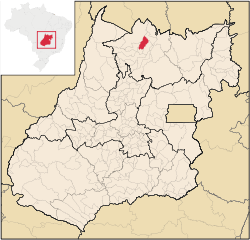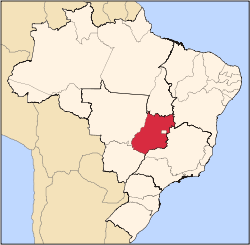Santa Tereza de Goiás
Santa Tereza de Goias is a municipality in north Goiás state, Brazil. Santa Tereza de Goiás is often spelled "Santa Teresa de Goiás".
Santa Tereza de Goiás | |
|---|---|
 Location in Goiás state | |
 Santa Tereza de Goiás Location in Brazil | |
| Coordinates: 13°42′55″S 49°00′40″W | |
| Country | Brazil |
| Region | Central-West |
| State | Goiás |
| Microregion | Porangatu Microregion |
| Area | |
| • Total | 794.5 km2 (306.8 sq mi) |
| Elevation | 409 m (1,342 ft) |
| Population (2007) | |
| • Total | 4,145 |
| • Density | 5.2/km2 (14/sq mi) |
| Time zone | UTC-03:00 (BRT) |
| • Summer (DST) | UTC-02:00 (BRST) |
| Postal code | 75455-000 |
Location
Santa Tereza is located in the extreme north of the state 35 km. south of Porangatu. It is on the important BR-153 highway. Highway connections starting in Goiânia are made by GO-080 / Nerópolis / São Francisco de Goiás / BR-153 / Jaraguá / GO-080 / Goianésia / Barro Alto / GO-342 / BR-080 / BR-153 / Uruaçu / Campinorte.
Santa Tereza de Goiás is surrounded by the following municipalities:
- north: Porangatu and Trombas
- south: Campinorte and Formoso
- east: Minaçu
- west: Mutunópolis
Political and Demographic Information
The mayor was Paulo Vieira da Costa (January 2005) and there were 9 members on the city council. The number of eligible voters was 3,238 (December/2007). The population density was 5,22 inhabitants/km2 (2007). The urban population was 3,475 and the rural population was 670 (2007).
- Population growth: -2,03% 1996/2007
Economic Information
The economy is based on subsistence agriculture, cattle raising, services, public administration, and small transformation industries.
- Industrial units: 1 (2007)
- Commercial units: 53 (2007)
- Automobiles: 293 (2007)
- Farms: 243 (2006)
- Permanent and Temporary Planted Area: 963 hectares
- Natural Pasture: 36,632 hectares
- Woodland and Forest: 15,847 hectares
- Workers related to the farm owner: 367
- Workers not related to the farm owner: 161 (IBGE)
- Cattle herd: 58,000 head (2006)
- Main crops: rice (700 hectares), bananas, beans, manioc, corn (600 hectares), and soybeans.
Quality of Life
In 2006 there were 6 schools and 1 hospital with 17 beds. The adult literacy rate was 84.7% (2000) (national average was 86.4%) and the infant mortality rate was 31.85 (2000) (national average was 33).
All data are from IBGE
Municipal Human Development Index: 0.729 (2000)
- State ranking: 150 (out of 242 municipalities)
- National ranking: 2,460 (out of 5,507 municipalities)
Seplan Economic Development Index
- The ranking was 192 out of 246 municipalities
Seplan Social Development Index
- The ranking was 183 out of 246 municipalities
See also
- List of municipalities in Goiás
- Microregions of Goiás
